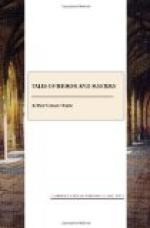And then suddenly I remembered how ancient this building was, and how probable that some mediaeval passage existed in it. There is hardly an old castle without one. The mysterious room was the basement of the turret, so that if there were anything of the sort it would open through the floor. There were numerous cottages in the immediate vicinity. The other end of the secret passage might lie among some tangle of bramble in the neighbouring copse. I said nothing to anyone, but I felt that the secret of my employer lay within my power.
And the more convinced I was of this the more I marvelled at the manner in which he concealed his true nature. Often as I watched his austere figure, I asked myself if it were indeed possible that such a man should be living this double life, and I tried to persuade myself that my suspicions might after all prove to be ill-founded. But there was the female voice, there was the secret nightly rendezvous in the turret-chamber—how could such facts admit of an innocent interpretation. I conceived a horror of the man. I was filled with loathing at his deep, consistent hypocrisy.
Only once during all those months did I ever see him without that sad but impassive mask which he usually presented towards his fellow-man. For an instant I caught a glimpse of those volcanic fires which he had damped down so long. The occasion was an unworthy one, for the object of his wrath was none other than the aged charwoman whom I have already mentioned as being the one person who was allowed within his mysterious chamber. I was passing the corridor which led to the turret—for my own room lay in that direction—when I heard a sudden, startled scream, and merged in it the husky, growling note of a man who is inarticulate with passion. It was the snarl of a furious wild beast. Then I heard his voice thrilling with anger. “You would dare!” he cried. “You would dare to disobey my directions!” An instant later the charwoman passed me, flying down the passage, white-faced and tremulous, while the terrible voice thundered behind her. “Go to Mrs. Stevens for your money! Never set foot in Thorpe Place again!” Consumed with curiosity, I could not help following the woman, and found her round the corner leaning against the wall and palpitating like a frightened rabbit.
“What is the matter, Mrs. Brown?” I asked.
“It’s master!” she gasped. “Oh, ’ow ’e frightened me! If you had seen ’is eyes, Mr. Colmore, sir. I thought ’e would ’ave been the death of me.”
“But what had you done?”
“Done, sir! Nothing. At least nothing to make so much of. Just laid my ’and on that black box of ’is—’adn’t even opened it, when in ’e came and you ’eard the way ’e went on. I’ve lost my place, and glad I am of it, for I would never trust myself within reach of ’im again.”
So it was the japanned box which was the cause of this outburst—the box from which he would never permit himself to be separated. What was the connection, or was there any connection between this and the secret visits of the lady whose voice I had overheard? Sir John Bollamore’s wrath was enduring as well as fiery, for from that day Mrs. Brown, the charwoman, vanished from our ken, and Thorpe Place knew her no more.




